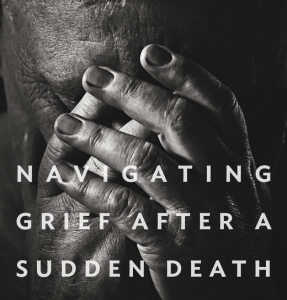Navigating Grief After a Sudden Death
By Jeff Jernigan, PhD, BCPPC, FAIS
*This is an article from the Fall 2021 issue of Contentment Magazine.
Sudden unexpected death presents a profound, immensely complex challenge for those who remain. Grief is one of the most painful emotions anyone can ever experience. A sudden loss can bewilder and disorient everyone touched by the loss, increasing the complexity for responding and reducing ability to understand and cope with the loss. Coping with loss is a very personal experience.
With a sudden loss you are confronted not only with the trauma of loss, but the trauma of how they passed. There is no time to emotionally prepare or make sense of the situation. It is important to encourage people in these circumstances to accept support and help even though it is a time of painful confusion. Emotional pain is a real thing. It hurts.
Pain brings with it an inability to focus, numbness, anxiety, difficulty with reasoning and decision making. This will pass. Allow people time to process, be an active listener, be accepting of their responses without criticism, acknowledge their pain. You cannot process grief intellectually. Grief is not linear and is most always messy. There is healing in the mess. Grief is natural and healthy, and we have been designed to grieve, each person in their own way. Other than general guidelines, there is no magic formula for resolving grief.
Grief experts help us understand there are cycles to grieving: denial, anger, bargaining, depression, and acceptance. However, these are not experienced by those grieving as steps or stages. We circle around in this spectrum, making forward progress and then stepping back into something we thought we were past. This recycling is normal, and we need simply to reassure those suffering a loss and experiencing these turnabouts that this is part of the process. Grief is a process, not an event.
Even silence during these times is therapeutic, reminding those suffering from feelings of resentment, shame, or guilt and anger that they have not been abandoned.
Sometimes the best thing we can do is be present with them. Even silence during these times is therapeutic, reminding those suffering from feelings of resentment, shame, or guilt and anger that they have not been abandoned. This gives others permission to lean into their emotions, learning to live with the loss. It is important to continue expressions of concern and support well after the response of people offering condolences, flowers, meals, cards, calls, and visits has passed. The reality and depth of the situation takes much longer to settle in. Be someone the griever can trust and talk to and confide their honest feelings.
Watch for withdrawal and isolation which may not be healthy. Encourage them to not engage with normal activities and routines immediately, diving back into work and other activities. Give them permission to accept their feelings, even the ugly ones. Pay attention to any emerging medical or mental health issues. Help them experience being listened to, understood, and taken seriously. Encourage them to get professional help if warranted.
Sudden death loss has an exaggerated effect on everyone, like ripples in a pond. Take care of yourself physically and emotionally. Understand and honor their grief, and its vicarious effect on you. You may have your own thoughts and emotions to deal with.
Be honest. Be a heart with ears. Thank you for what you do!
ABOUT THE AUTHOR

Jeff Jernigan, PhD, BCPPC, FAIS is a board-certified mental health professional known for influencing change in people and organizations by capitalizing on growth and change through leadership selection and development. Jeff currently serves Stanton Chase Pacific as the regional Life-Science and Healthcare Practice Leader for retained executive search and is the national subject matter expert for psychometric and psychological client support services.
A lifetime focus on humanitarian service is reflected in Jeff’s role as the Chief Executive Officer and co-founder, with his wife Nancy, for the Hidden Value Group, an organization bringing healing, health, and hope to the world in the wake of mass disaster and violence through healthcare, education, and leadership development. They have completed more than 300 projects in 25 countries over the last 27 years. Jeff currently serves as a Subject Matter Expert, Master Teacher, Research Mentor, or Fellow in the following professional organizations: American Association of Suicidology, National Association for Addiction Professionals, The American Institute of Stress, International Association for Continuing Education and Training, American College of Healthcare Executives and the Wellness Council of America.
Contentment Magazine
The dictionary defines “content” as being in a state of peaceful happiness. The AIS magazine is called Contentment because we want all of our guests and members to find contentment in their lives by learning about stress management and finding what works best for each them. Stress is unavoidable, and comes in many shapes and sizes that makes being in a state of peaceful happiness seem like a very lofty goal. But happiness is easy to find once you are able to find ways to manage your stress and keep a healthy perspective when going though difficult times in life. You will always have stress, but stress does not always have you!

Leave A Comment
You must be logged in to post a comment.